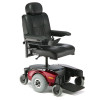Invacare M61 Owners Manual - Page 17
Coping With Everyday Obstacles - used wheelchair
 |
View all Invacare M61 manuals
Add to My Manuals
Save this manual to your list of manuals |
Page 17 highlights
SECTION 3-SAFETY/HANDLING OF WHEELCHAIRS Coping With Everyday Obstacles ƽ WARNING DO NOT attempt to reach objects if you have to move forward in the seat or pick them up from the floor by reaching down between your knees. Proper positioning is essential for your safety. When reaching, leaning, bending or bending forward, it is important to use the casters as a tool to maintain stability and balance. Many activities require the wheelchair user to reach, bend and transfer in and out of the wheelchair. These movements will cause a change to the normal balance, center of gravity, and weight distribution of the wheelchair. To determine and establish your particular safety limits, practice bending, reaching and transferring activities in several combinations in the presence of a qualified healthcare professional before attempting active use of the wheelchair. NOTE: For this information, refer to FIGURE 3.1. Coping with the irritation of everyday obstacles can be alleviated somewhat by learning how to manage your wheelchair. Keep in mind your center of gravity to maintain stability and balance. While the walking beam allows to traverse up to a 2‐inch bump or threshold, stopping after the wheels cross the bump poses a problem. The chair cannot reverse over the bump at this point. Continue forward and then turn around. While the wheelchair is designed for use primarily in and around the home, the provider should determine whether this chair is suitable for the actual environment the chair will be used in. DO NOT go down ramp at full speed. Some seat/back positions will cause wheelchair to feel unstable. 2-inch Bump or Threshold FIGURE 3.1 Coping With Everyday Obstacles CAUTION Be aware of condition of ramp. Traction will be diminished/nonexistent on a slippery surface. Proceed with caution. Part No 1125085 17 Pronto® M51™and M61™with SureStep®















